NEW YORK CITY
Growing the 'technology ecosystem' of the future in New York City
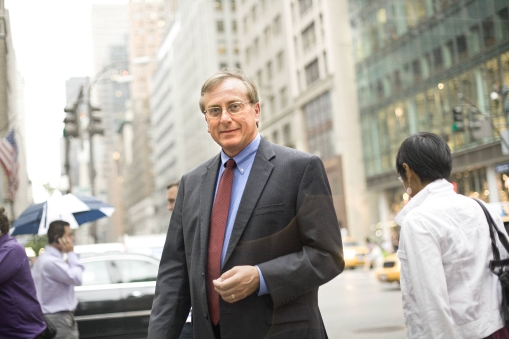
Cornell Provost Kent Fuchs in Manhattan
On July 19, Cornell announced it would respond to a request for proposals from New York City Mayor Michael Bloomberg for an applied sciences and technology campus in the city. Proposals are due to the city Oct. 28, and the city will award the contract in late December. Cornell Provost Kent Fuchs; Lance Collins, dean of the College of Engineering; and Daniel Huttenlocher, dean of Computing and Information Science, recently answered questions about why Cornell is the right choice for the project.
Q: How committed is Cornell to the New York City tech campus initiative?
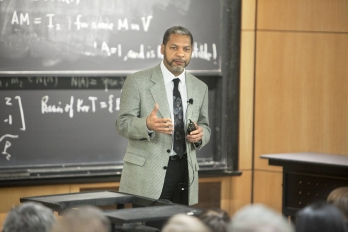
College of Engineering Dean Lance Collins See larger image

New York City skyscrapers See larger image

New York City subway sign See larger image

Roosevelt Island tram See larger image

Cornell President David Skorton in Manhattan See larger image
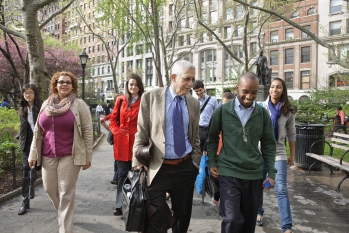
Cornell students and faculty on New York City streets See larger image
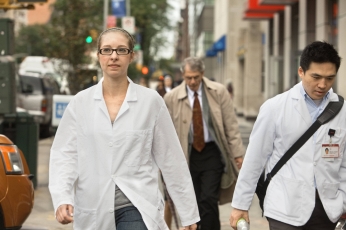
Weill Cornell Medical College students in New York City See larger image

A Cornell student waits for the subway See larger image
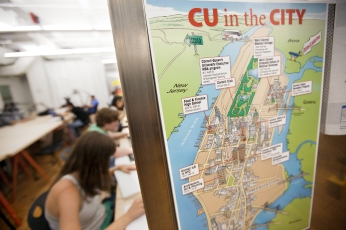
Illustrated map showing the physical footprint of Cornell's Manhattan campus on display in a Cornell office See larger image
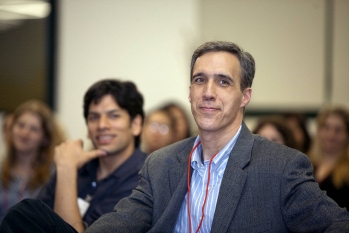
Dean of Computing and Information Science Daniel Huttenlocher See larger image
Kent Fuchs:100 percent. Cornell is the world leader in areas critical for New York City's future tech sector, and we are committed to the city itself. We have programs and initiatives in the city already, and technology and applied sciences are exactly the areas in which we are committed to growing. The urban environment gives us the opportunity to create technology transfer and significantly contribute to the state of New York, specifically New York City's economy.
Q: Will the proposed New York City tech campus compete with the Ithaca campus in terms of resources, faculty and students?
Fuchs: Our goal for this new campus is to have no negative impact at all on the Ithaca campus in terms of funding or competition for programs and, in fact, to enhance the opportunities for those on the Ithaca campus to participate in new programs in the New York City urban environment. We will hire new full-time faculty, and in addition, faculty and students from Ithaca will spend time at the New York City campus either over summers or away on sabbatical.
Our expectation is that the operating budget will be funded through a number of sources including research grants; contracts with the government, companies and foundations; graduate tuition; as well as philanthropy. Additionally, there will be some income from the development on the physical site, as we are proposing that some companies and others lease space relevant to programs there.
Q: What types of students will populate the new campus?
Fuchs: Given the goal of leading-edge research resulting in new businesses and innovation, the campus will be focused on graduate education. We anticipate attracting 1,000 or more Ph.D. and master's students to earn their degrees on this campus.
We are not proposing to grow Cornell's undergraduate program through this initiative. However, we would expect a significant number of Ithaca undergraduates having summer or semester-long internships there, or being involved in research projects as interns.
Q: How will research programs on the new campus be organized?
Fuchs: The focus of this initiative from the city's perspective is to create new high-technology jobs by supporting intellectual property and knowledge, resulting in economic development for the city. As a result, we decided not to organize the campus in a traditional way with colleges, schools and departments, but rather to have this new campus focus on very broad application domains, which we are calling research "hubs," that are relevant to new and existing companies and are applicable to the industries that matter to NYC. We wanted to focus on applications more than fundamental academic disciplines.
We expect that faculty and students from all kinds of areas can be involved in these hubs, which we also see changing over time. This gives us an agility that a traditional academic environment does not have, while still maintaining academic excellence because the disciplines are tied back to academic homes in Ithaca.
Q: What is a "technology ecosystem," and how is Cornell going to support one in New York City?
Daniel Huttenlocher: By this we mean a collection of companies at different stages of development – [from] very early startups tying back to things going on in research labs and universities [to] larger corporations that might be customers or potential acquirers for what those smaller companies are doing. The pace of developing new companies is getting faster and faster, and the key factor is getting the right people into an environment where they can focus on and solve the most relevant technology problems. Cornell alumni already play a leading role in the New York City tech startup ecosystem, and this campus will increase that manyfold. We envision an environment that encourages our students to start companies in New York City over any other area of the country.
Q: How is Cornell poised academically to lead the New York City tech campus initiative?
Lance Collins: We have a top-rated College of Engineering, a top-rated Computing and Information Science program, an outstanding electrical and computer engineering department, expertise in advanced materials, and in nanotechnology we are one of the premier universities in the country. It's important to have strengths in all these areas, particularly those aligned with New York City's tech industries, to create new technologies that will be commercially viable. Also, we have a culture for interdisciplinary research that we will replicate in New York City. This culture has developed over decades and involves a combination of an administrative setup and a campus personality that allows us to interact in ways that cannot be found at most universities.
Q: What kind of experience does Cornell have in developing and running a remote campus?
Fuchs: Cornell has a history of developing programs in New York City, where we have our Weill Cornell Medical College – now engaged in a $1 billion capital project that includes a new medical research facility – and each of our colleges has academic and research programs in the city. We also have experience overseas – for example, our highly successful medical school in Qatar, which we launched 10 years ago.
For more information, visit www.cornell.edu/nyc/.